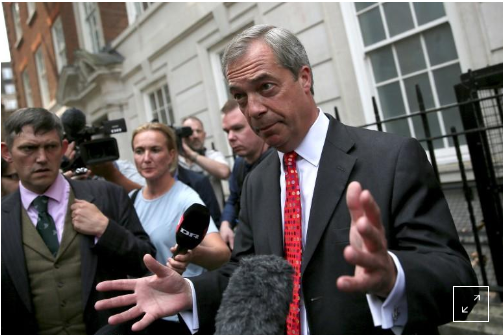Florian Galler
Remarks on Group Process, Mar 26, 2019
Brexit: Ideology and Promise
The British prime-minister Theresa May will probably not be able to address reasonable members of parliament in order to achieve a solution with the EU without self-inflicted wounds and worldwide damage to EU and legitimation of Democracies. I also do not expect Jeremy Corbyn, the leader oft he Labour Party to be willing or able to unite moderate, non- ideological members of Parliament.
May seems to be preoccupied with the extreme Brexiteers in her own party and their ideology. These people direct a lot of feelings of hate and wishes of destruction toward the EU. See for example the following group fantasies of destruction by prominent Brexiteer Nigel Farage in an interview with Italy’s daily newspaper Corriere della Sera two weeks before the Brexit vote, which was held on Jun 23, 2016:

Leader of the United Kingdom Independence Party (UKIP) Nigel Farage speaks to media at the launch for an EU referendum poster in London, Britain June 7, 2016. REUTERS/Neil Hall
MILAN (Reuters) – The European Union will start disintegrating after Italians pick the anti-establishment 5-Star Movement candidate as mayor of Rome on June 19 and Britons vote to leave the EU four days later, the leader of the UK Independence Party was quoted as saying.
UKIP’s Nigel Farage told Italy’s Corriere della Sera in an interview published on Saturday that British Prime Minister David Cameron should resign even if the ‘Remain’ camp won by a narrow margin in a June 23 referendum on EU membership.
“We can’t lose this referendum … there will be a Big Bang of British politics: nothing will remain the same,” Farage said. He said he would “destroy the old EU”, together with 5-Star leader Beppe Grillo.
“On June 19 the 5-Star movement elects the mayor of the capital and changes Italy. On June 23 Britain leaves the EU and changes Europe. We will trigger a domino effect. After us, other northern European countries will leave, starting with Denmark,” he said. “The EU is about to collapse, disintegrating in several pieces.”
Brexit campaigner Farage says UK, Italy to launch EU’s disintegration ( Reuters via World News, June 11, 2016)
Nobel Prize winning economist Paul Krugman in 2011 called the European societies «the most decent in human history». I think this is right. But that does not protect these societies from deep feelings of contempt, hate and rage which are projected on them by dissociated personality parts of their inhabitants.
An objective truth is not strong enough to determine our political preferences. Our spontaneous behavior reveals that feelings of weakness, rage, hate and contempt are connected with reasonable democratic institutions. What is good in our real lives, is bad for the defense of our traumatic feelings from early trauma in national politics. The more advanced our civilisations, the less these early traumas will be acted out by our political systems. The more advanced, reasonable and fair a democracy, the more feelings of contempt and hate are directed at it. The Brexiteers hate the EU, and international integration in general, because they are connected with lots of rules designed to produce decent societies and prevent destructive reinactements of traumatic experiences of the inhabitants.
However, deep feelings of rage and anxiety are not warded off anymore by our states. Under the influence of our dissociated personality parts, our alter egos, we unconsciously want to destroy the «most decent societies of mankind».
Identification with an ideology in state of collective madness enables a re-establishment of a prenatal relationship with a good, nurturing placenta accompanied with feelings of strength and purification. Governments as in Russia which are willing and able to act out our prenatal traumatic feelings in politics are spontaneously evoking feelings of strength and purification and not of contempt and hate as in the case of real democracies :
Within Russia, Putin remains a remarkably popular figure. Though his domestic approval ratings have dipped recently, at 66 percent they still remain the envy of most Western politicians.
Russian influence is perceived as growing around the world, despite global mistrust of Putin (Washington Post, Dec. 6, 2018)
The identification with the alter ego and a destructive ideology induces spontaneous feelings of promise and purification in us. So the radical left in the USA probably did not vote for Hillary Clinton in 2016, because they shared the feelings of contempt for her and the so-called establishment without preoccupation and regret.
I think there is a considerable risk that neither May nor Corbyn will be able to distance themselves from vicious unconscious group wishes behind their mad politics.
English Proofreading by Rudy Weiler (www.rweiler.ch)
